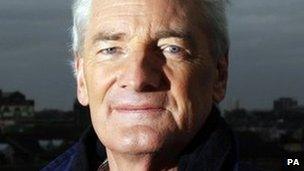Sir James Dyson calls for UK technology business boost
- Published

Inventor Sir James Dyson has called on the government to do more to boost the UK's technology industry, warning of a shortfall of engineering graduates.
He told the Radio Times that "the glamour of web fads and video gaming" was being put ahead of "tangible technology that we can export".
He warned there would be a deficit of 60,000 engineering graduates this year.
The Department for Business, Innovation and Skills said it was looking to support engineering "at all levels".
Sir James said: "The government must do more to attract the brightest and best into engineering and science so that we can compete internationally.
"26% of engineering graduates do not go into engineering or technical professions. More worrying is that 85% of all engineering and science postgraduates in our universities come from outside the UK.
"Yet nine in 10 leave the UK after they finish their studies. British knowledge is simply taken abroad.
"Engineering postgraduates need to be encouraged with generous salaries. A salary of £7,000 a year for postgraduate research is insulting."
The 65-year-old entrepreneur is famous for inventing the Dyson bagless vacuum cleaner.
Greatest inventions
A Department for Business, Innovation and Skills spokesman said: "Engineering graduates go into a range of sectors, including financial services and retail as well as manufacturing.
"We are working closely with industry and continue to look at various ways to support engineering at all levels, including engagement in schools, apprenticeships and postgraduate training. Applications for engineering courses at university have held up this year.
"We have committed £3m to create up to 500 additional aeronautical engineers at masters level over the next three years, co-funded with industry."
The BBC has created a list of the 50 greatest British inventions as part of its Genius of Invention season, and Radio Times wants readers to vote for their favourite.
The list is dominated by 19th Century inventions, particularly those from the 1820s.
These account for 10% of the total, including Faraday's electric motor (1821), waterproof material (1823), Aspdin's cement (1824), George Stephenson's passenger railway (1825) and the lawnmower by Edwin Beard Budding (1827).
- Published7 January 2013
- Published11 December 2012
- Published29 June 2012